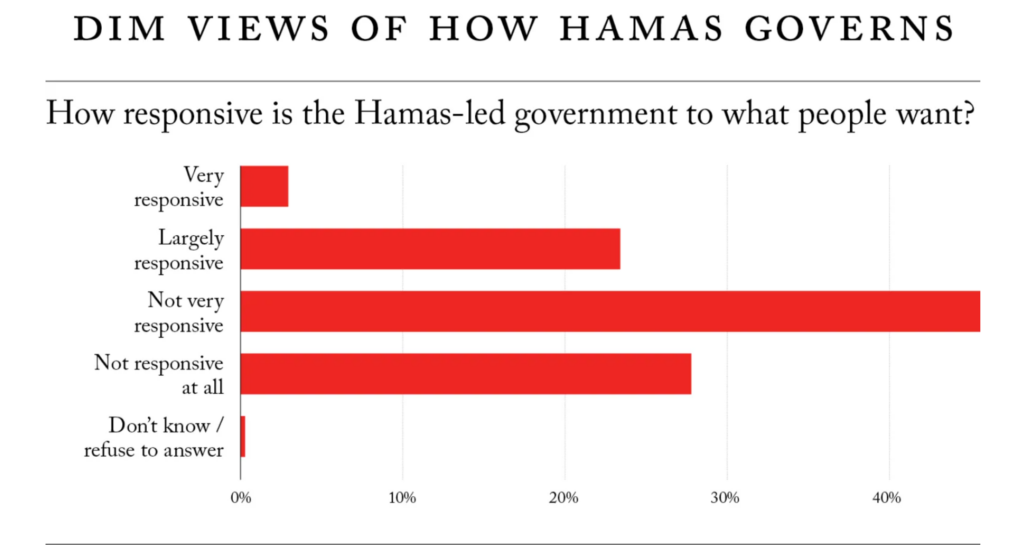Democracies like Israel can only ultimately defeat autocratic actors like Hamas by “presenting an alternative ideology that is more attractive,” says Yossi Mekelberg, Associate Fellow of the MENA Program at Chatham House in London.
Israel faces a major dilemma in fighting an enemy that hides among civilians, as mass civilian casualties feed into Hamas’s strategy of inculcating in its supporters a hatred of Jews—whom its leaders, committed to violent jihad, regularly refer to as “sons of apes and pigs,” “murderers of prophets,” filth, and human garbage, adds Washington Institute analyst Michael Eisenstadt. For those Palestinians who do not support Hamas or buy into its ideology, Hamas seeks to ensure, by using them as human shields, that they suffer heavy losses in order to foster hatred of the enemy while garnering sympathy abroad. For Israel, there is no easy solution to this dilemma.

Arab Barometer
Indeed, the argument that the entire population of Gaza can be held responsible for Hamas’s actions is quickly discredited when one looks at the facts, according to analysts Amaney A. Jamal and Michael Robbins.
Arab Barometer’s survey of the West Bank and Gaza, conducted in partnership with the Palestinian Center for Policy and Survey Research and with support from the National Endowment for Democracy, just days before the Israel-Hamas war broke out reveals that rather than supporting Hamas, the vast majority of Gazans have been frustrated with the armed group’s ineffective governance as they endure extreme economic hardship. Most Gazans do not align themselves with Hamas’s ideology, either. Unlike Hamas, whose goal is to destroy the Israeli state, the majority of survey respondents favored a two-state solution with an independent Palestine and Israel existing side by side, they write for Foreign Affairs.
The worst part of Hamas’s cynicism is that it intended to provoke the kind of devastating Israeli overreaction that is unfolding on the ground today, notes Hussein Ibish, Senior Resident Scholar at the Arab Gulf States Institute in Washington (AGSIW).
Hamas intends to use this insurgency to, at long last, succeed in taking over the national movement by pointing out that it and it alone is battling Israeli troops for control of Palestinian land, he writes for The New Republic. That’s how and why Hamas placed over 2 million Palestinians in mortal danger, and achieved, in exchange, absolutely nothing except the mass murder of innocent Israelis that shocked the world and inflicted significant damage, however unfair, on the reputation of the Palestinian people and national movement generally.
“It is critical that we provide our ally with the necessary tools to defeat Hamas… because we cannot allow terror and enemies of democracy to win,” said Senator Jon Tester, Chair of the U.S. Senate Appropriations Subcommittee on Defense. A bipartisan aid package “sends a clear message to the enemies of freedom and democracy that they will not prevail.”
 Russia has aligned itself with authoritarian actors like Hamas “out of desperate necessity,” said Nicholas Aucott, a Senior Advisor at the UK Delegation to the OSCE:
Russia has aligned itself with authoritarian actors like Hamas “out of desperate necessity,” said Nicholas Aucott, a Senior Advisor at the UK Delegation to the OSCE:
In what has historically been a monologue of disinformation, Russia may proclaim a new world order; but this is a world order in which Russia invites the Hamas terrorist group to Moscow, following Hamas’s brutal murder of over 1400 Israeli citizens; it is the world order of allying with Iran, the provider of Shahed one way attack drones which have been used extensively by Russia to kill Ukrainian civilians and attack critical infrastructure; and the development of North Korea as Russia’s new strategic arms partner and provider of military aid.
The ideology of Hamas is not a response to Israeli violence, says Paul Berman, author of Terror and Liberalism. Rather it is a pre-Israeli doctrine, reflects the intimate connections between radical Islamism and European totalitarianism, specifically fascist and Nazi ideology.
Larry Diamond, the Mosbacher Senior Fellow in Global Democracy at FSI Stanford and William L. Clayton Senior Fellow at the Hoover Institution, hosts a discussion (above) on the conflict with Abbas Milani, the Hamid and Christina Moghadam Director of Iranian Studies; Or Rabinowitz of the International Relations Department of the Hebrew University of Jerusalem and a visiting associate professor at FSI’s Center for International Security and Cooperation; and Amichai Magen, of the Lauder School of Government, Diplomacy, and Strategy, Reichman University in Herzliya, Israel, and the inaugural visiting fellow in Israel Studies at FSI.
#Hamas‘s #authoritarian ideology draws explicitly on European totalitarianism via the fascist & Nazi ideas absorbed by the early Muslim Brotherhood, writes Paul Berman, author of Terror and Liberalism. https://t.co/yW6BaP750L
— Democracy Digest (@demdigest) November 1, 2023







